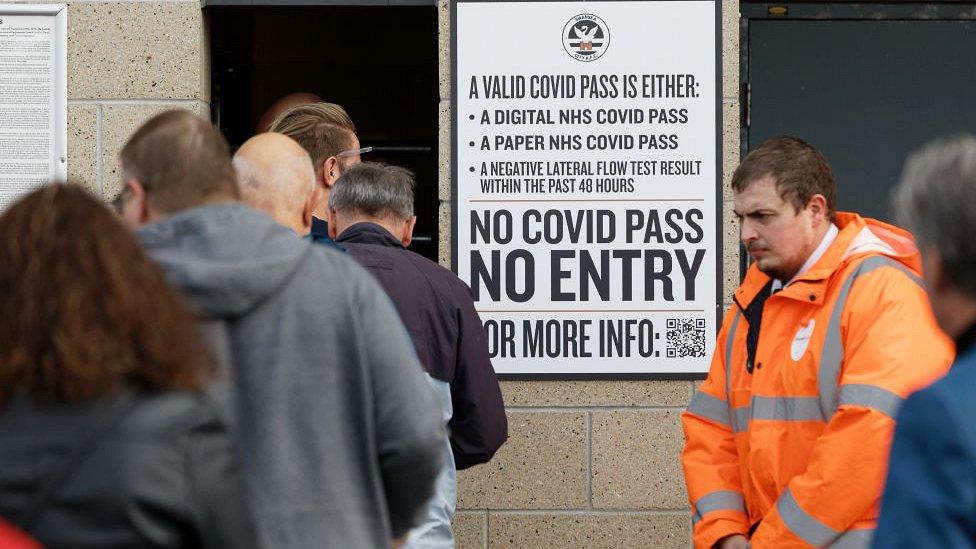Get Covid jab or restrictions more likely, Sajid Javid says
- Published
Sajid Javid said people should take up their offer of a jab, or risk restrictions being reimposed
If not enough people get vaccinated, it is more likely restrictions will be reintroduced in England, the health secretary has said.
Sajid Javid said the government would not be bringing in its Plan B measures, which include mandatory face coverings and working from home, "at this point".
He added that he did not believe the current pressures on the NHS were unsustainable.
But he warned cases could rise to 100,000 a day.
Daily Covid cases have been above 40,000 for eight days in a row, with 49,139 new infections reported on Wednesday.
NHS leaders have said some restrictions must immediately be reintroduced if England is to avoid "stumbling into a winter crisis".
Under the government's plan for tackling Covid in England over the winter, restrictions will only be reintroduced if the NHS comes under "unsustainable pressure".
Plan B also includes introducing mandatory Covid passports.
Mr Javid told a Downing Street news conference: "If not enough people get their booster jabs, if not enough of those people that were eligible for the original offer... if they don't come forward, if people don't wear masks when they really should in a really crowded place with lots of people that they don't normally hang out with, if they're not washing their hands and stuff, it's going to hit us all.
"And it would of course make it more likely we're going to have more restrictions."
However, No 10 earlier said there were no plans for another lockdown in England.
Asked about the pressures on the NHS, Mr Javid said: "Don't get me wrong, there are huge pressures, especially in A&E, in primary care. At this point we don't believe they're unsustainable."
"If we feel at any point it's becoming unsustainable… we won't hesitate to act," he added.

Prof Stephen Powis, national medical director of NHS England, said he expected the number of Covid patients in hospitals to continue to rise due to the high number of infections in the community.
"It undoubtedly feels exceptionally busy in the NHS and our NHS organisations are telling us that all the time," he said.
Prof Powis said there was "no one number" that the government would consider to trigger new restrictions - but it would look at factors including infection rates, vaccine effectiveness, hospital admissions, as well as flu and other viruses.
As of Tuesday, there were 7,891 patients in hospital. Another 179 people were reported to have died within 28 days of testing positive for the virus on Wednesday.


It is important to remember that the situation is very different to 12 months ago.
The vaccination programme has transformed the situation, and has completely changed the calculation for ministers about the risks of coronavirus cases spreading, versus the many downsides of restrictions.
But there are nerves in Westminster about what might happen next. The health secretary warned the pandemic is not over, and the government's efforts to control it can't be either.
And once again, at those famous three lecterns in Downing Street, ministers are asking all of us to think again about how we act.
The ultimate fear from the government's critics is that, in an echo of last autumn, their actions to control the disease could come too late.

Mr Javid also announced that people eligible for a Covid booster jab can book online if they have not received an invite from the NHS.
Booster doses can be offered to people who are at least six months on from receiving their second dose.
The health secretary said boosters could be booked online if people had not been invited within a week of reaching the six month milestone.
Separately, around 14% of people in the UK aged 12 and over remain unvaccinated.
Labour's shadow health secretary Jonathan Ashworth accused Mr Javid of complacency, telling the BBC: "The simple truth is that the so-called wall of defence we've built up with vaccination is now crumbling."
He said it was disappointing the health secretary did not give details on "how he is going to grip this and drive up the vaccinations we need".
Meanwhile, the government has agreed deals for two new Covid treatments.
The Antivirals Taskforce has secured 480,000 courses of molnupiravir, which trials found cuts the risk of hospital admission or death by about half, as well as 250,000 courses of PF-07321332/ritonavir, which is currently undergoing clinical trials.
If approved by the UK's medicines regulator, the Department of Health said thousands of patients would be able to access the treatments this winter.
Related topics
- Published20 October 2021
- Published20 October 2021

- Published1 July 2022

- Published22 October 2021

- Published2 April
